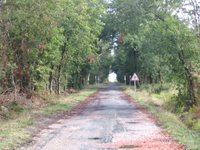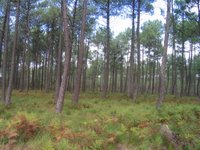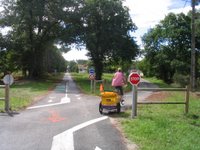Touched by human hands
Riding the bike paths around here is affords an excellent view of the landscape here.

Someone I met here recently remarked how so much of what one sees in Western Europe is the result of having been touched and retouched by human hands. His observation was offered without any discernable ironic intention, nothing more or less than a self evident proposition. It is interesting to consider what human hands are capable of doing. Some of my friends are artists, and some of them explore the aesthetic possibilities of "found objects". Most of those objects, though by no means all, are things that have already been "touched" by other hands, put to some other purpose and perhaps been discarded. I'm tempted to call what they do a kind of aesthetic recycling whereby nothing is devalued as mere trash; rather it becomes grist for the creative and transformative efforts of those who "find" it.
In the beginning of the 19th century the sandy dunes along the Bay of Gascony were encroaching inland at the rate of nearly 140 feet per year. Apparently entire villages were displaced or simply disappeared. Certain French engineers undertook the task of "stabilizing" the dunes... at first they tried stakes and fences but later turned to organic approaches. The results so impressed Emperor Napoleon III that he oversaw a vast tree planting project the results of which can be seen up and down the presque isle where we live. Pine forests growing in the sandy soil, beneath them a thick covering of ferns.
 The bike paths and the forests here are maintained to a degree that we would probably find overzealous...but each is a piece of handiwork that in it's own way offers testimony to the hands that had the temerity to touch something. At home we are perhaps lulled by the illusion of a pristine natural world...That illusion beckons "leave well enough alone"...it seems a natural if also plaintive sentiment, if only we could be sure that leaving things alone was even remotely possible. Leaving things alone is not one of the things we humans do...at least not with our hands.
The bike paths and the forests here are maintained to a degree that we would probably find overzealous...but each is a piece of handiwork that in it's own way offers testimony to the hands that had the temerity to touch something. At home we are perhaps lulled by the illusion of a pristine natural world...That illusion beckons "leave well enough alone"...it seems a natural if also plaintive sentiment, if only we could be sure that leaving things alone was even remotely possible. Leaving things alone is not one of the things we humans do...at least not with our hands.
K

Someone I met here recently remarked how so much of what one sees in Western Europe is the result of having been touched and retouched by human hands. His observation was offered without any discernable ironic intention, nothing more or less than a self evident proposition. It is interesting to consider what human hands are capable of doing. Some of my friends are artists, and some of them explore the aesthetic possibilities of "found objects". Most of those objects, though by no means all, are things that have already been "touched" by other hands, put to some other purpose and perhaps been discarded. I'm tempted to call what they do a kind of aesthetic recycling whereby nothing is devalued as mere trash; rather it becomes grist for the creative and transformative efforts of those who "find" it.

In the beginning of the 19th century the sandy dunes along the Bay of Gascony were encroaching inland at the rate of nearly 140 feet per year. Apparently entire villages were displaced or simply disappeared. Certain French engineers undertook the task of "stabilizing" the dunes... at first they tried stakes and fences but later turned to organic approaches. The results so impressed Emperor Napoleon III that he oversaw a vast tree planting project the results of which can be seen up and down the presque isle where we live. Pine forests growing in the sandy soil, beneath them a thick covering of ferns.
 The bike paths and the forests here are maintained to a degree that we would probably find overzealous...but each is a piece of handiwork that in it's own way offers testimony to the hands that had the temerity to touch something. At home we are perhaps lulled by the illusion of a pristine natural world...That illusion beckons "leave well enough alone"...it seems a natural if also plaintive sentiment, if only we could be sure that leaving things alone was even remotely possible. Leaving things alone is not one of the things we humans do...at least not with our hands.
The bike paths and the forests here are maintained to a degree that we would probably find overzealous...but each is a piece of handiwork that in it's own way offers testimony to the hands that had the temerity to touch something. At home we are perhaps lulled by the illusion of a pristine natural world...That illusion beckons "leave well enough alone"...it seems a natural if also plaintive sentiment, if only we could be sure that leaving things alone was even remotely possible. Leaving things alone is not one of the things we humans do...at least not with our hands.K


0 Comments:
Post a Comment
<< Home